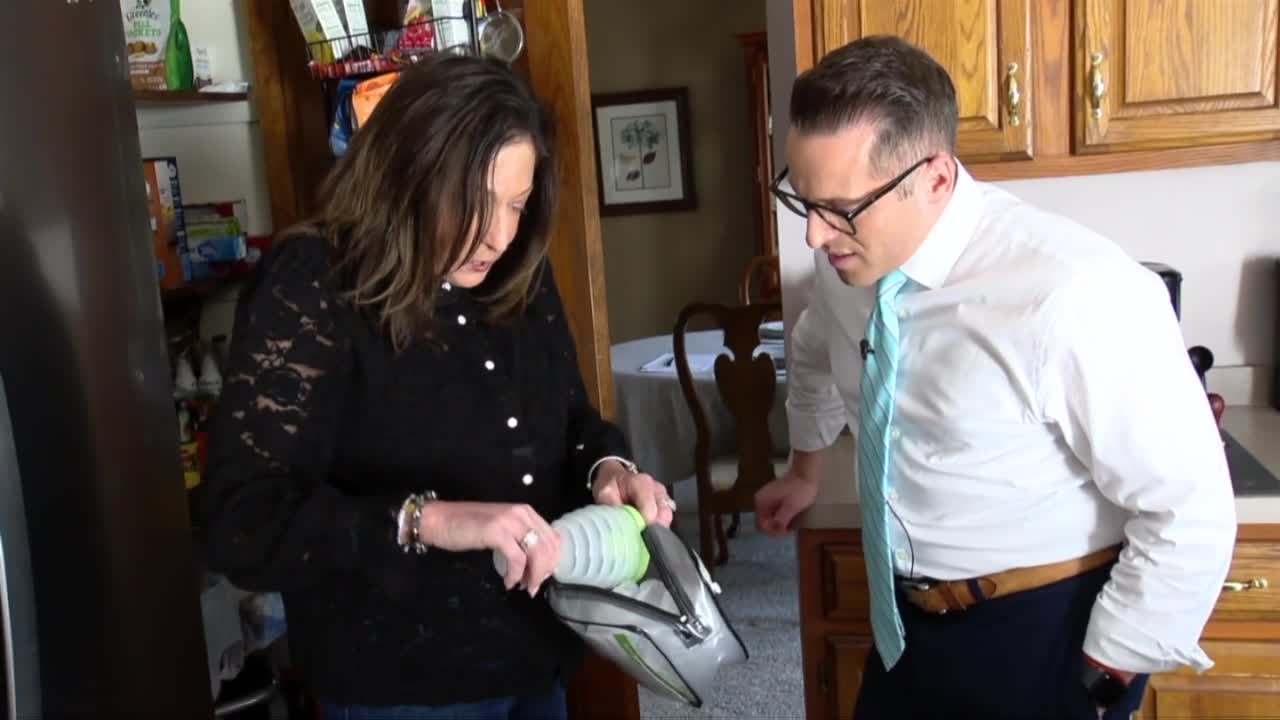LANCASTER, N.Y. (WKBW) — A $25,000 grant is coming under the microscope, sent from Albany, straight to People Inc. This money was used to purchase anti-choking devices to be used within their facilities.
But these devices are not approved for use by some key state and federal agencies. So where's the disconnect and is this the best use of your taxpayer dollars?
Christine Opera has a clear plastic bag, ready to go inside her Lancaster home, in case of an emergency. It's hanging in her pantry with a plunger and some masks. It's a tool to suck something out of your throat if you're choking.
WATCH: Is this the best use of your taxpayer dollars?
It was something she bought after choking on a piece of steak at a wedding.
This anti-choking device was a good idea to buy, Opera thought, even though a nearby nurse gave her the Heimlich at the time.

Drantch: What's the benefit of having these vacuums?
Opera: I think I just feel better knowing that there is something in the house. The the only thing is, under pressure, I'm not sure if I would be able to get it out of the package.
To Opera's point, the Food and Drug Administration explains, in a 2024 memo:
"...anti-choking devices first could delay action as consumers usually have to take them out of packaging assemble them and follow device instructions which may delay the use of established rescue protocols."
The FDA does not endorse and has not cleared these products.
Opera: I did not know it wasn't FDA approved.
Drantch: Well, what do you make of that statement?
Opera: I mean, it's pretty scary.
Beyond that, the state Office of Children and Family Services put out a letter, earlier this year, explaining established rescue protocols do not include anti-choking devices. That includes a device called LifeVac.
But People Inc. is now using that device, thanks to a $25,000 grant from New York State.
"Knowing the propensity of choking for people that we serve, we thought it would be an additional asset for us to implement," said Anne McCaffrey, People Inc. President and CEO.

Drantch: Is this the best way to spend that money?
McCaffrey: We think so. I mean, this is going to impact thousands of lives potentially.

That grant bought about 200 of these LifeVac devices. They are placed in each of the organization's residential homes and day programs.
Marylyn Militello is the Chief Program Officer at People Inc. She calls herself "an old nurse."
Drantch: So you're very keen on following rules and regulations
Militello: Correct.
Drantch: The FDA has not endorsed these products and the FDA has in fact said, that the Heimlich maneuver is what should be used first and foremost. How as a nurse, with a nursing background do you respond to that knowing these are now part of your toolbox?
Militello: We have had a lot of discussion around that, understanding that this has not gone through the FDA approval at this time.
Assemblymember Karen McMahon sponsored that grant. "Whether it is endorsed by these organizations, I don't know if that really matters," she said.
Drantch: This $25,000 grant for a device that is not endorsed by the FDA, for instance, is this the best use of taxpayer dollars?
McMahon: I don't think it's a bad use of money to provide equipment that would save that could potentially save someone's life. If this was some crackpot device, the Assembly would have probably stepped in and said, 'oh, I'm sorry. No this is not something we're going to endorse or fund.'

That grant is funding Arthur Lih, the Founder and CEO of LifeVac. The company claims to have saved more than 4,000 lives at homes, schools and workplaces.
"We're one of the companies working with the FDA to kind of reclassify these suctions devices," Lih said.
An FDA spokesperson would not confirm Lih's statement explaining,
The FDA generally cannot confirm or deny the existence of a pending product application that has not been previously been publicly disclosed by the sponsor, or discuss the status of a pending application.
Lih says his product is just another option for the Intellectual and Developmental Disabilities community, which People Inc. serves. Lih said if the Heimlich maneuver didn't work, that community would be in trouble.
"I don't know how we could say providing an option for people that may have no option, particularly those with challenges, is a bad idea," Lih said. "I don't know how we would argue that we should just let them die."
But Christine Opera is now thinking twice about using a similar device. She said she doesn't have faith in them, "knowing they are not approved I probably wouldn't use it now."
The American Red Cross does not endorse LifeVac, nor any other anti-choking devices.
In a statement, the Red Cross says,
"Based on the findings from a review by the American Red Cross Scientific Advisory Council, back blows and abdominal thrusts should be used as standard treatment for an airway obstruction for a conscious person. If the standard treatment is not working, or not feasible, anti-choking devices are an option to consider for attempted removal of an airway obstruction.
The Red Cross does not endorse LifeVac or any other anti-choking devices and recognizes the need for further high quality, independent, randomized studies of such devices, as well as FDA approval."
Since People Inc. got these LifeVac devices in January, the 7 News I-Team has learned they've been used four times. A spokesperson says, "in each case, abdominal thrusts were carried out but unsuccessful, so the Life Vac [sic] was then used and the obstructions were dislodged."





